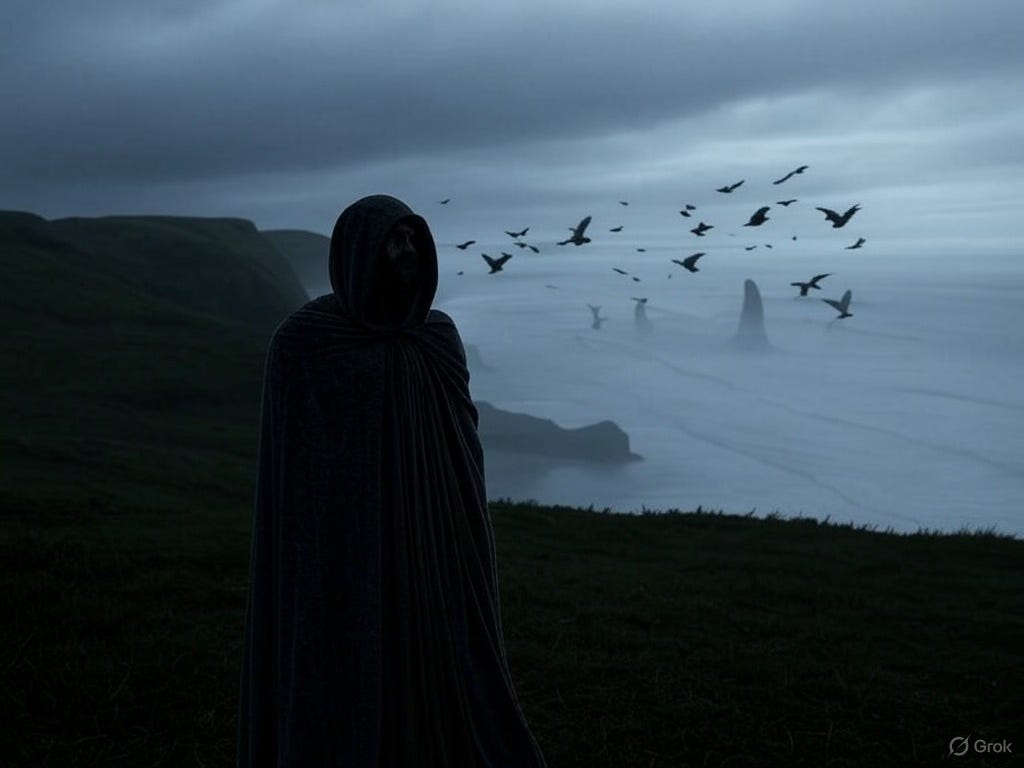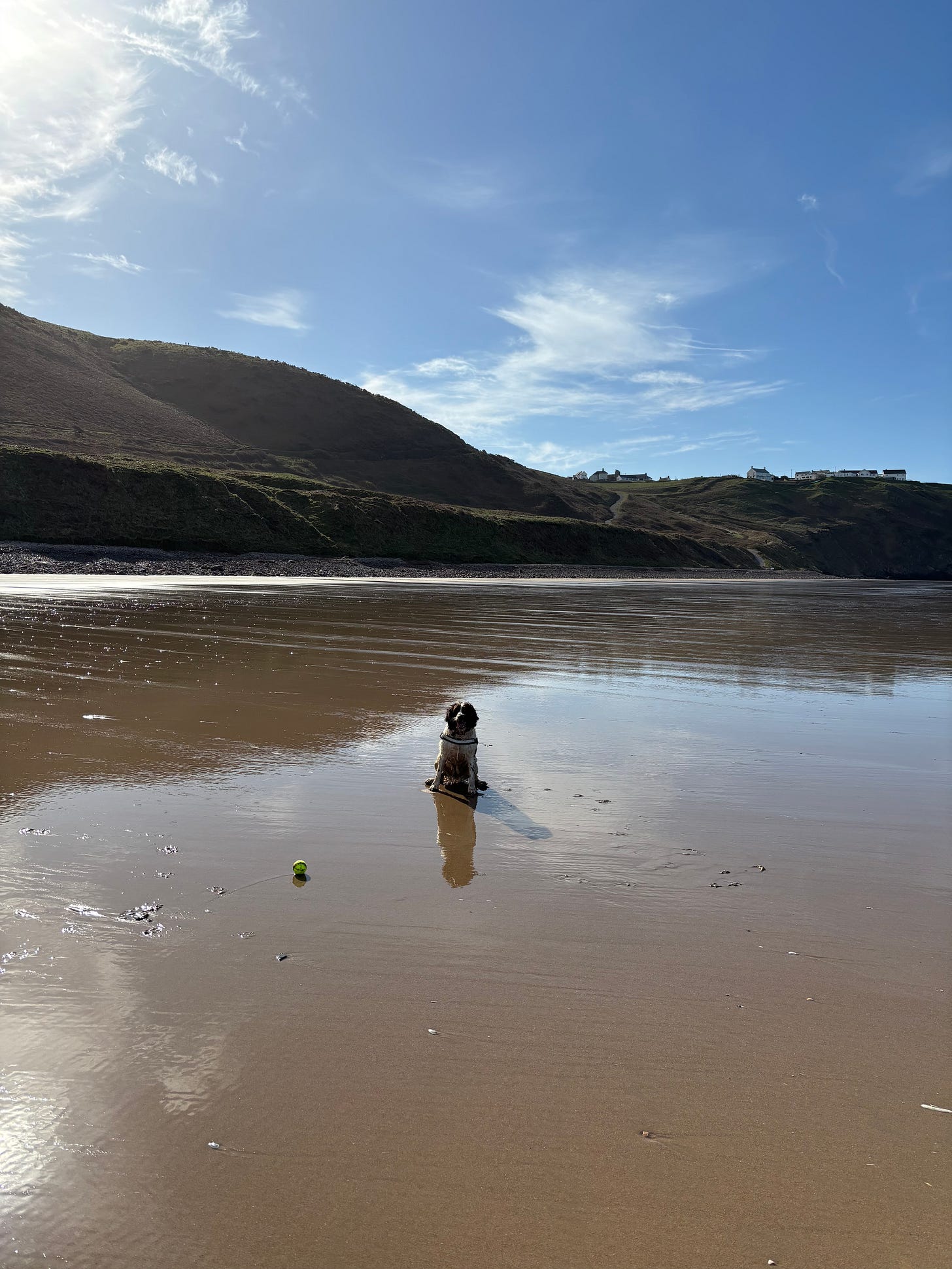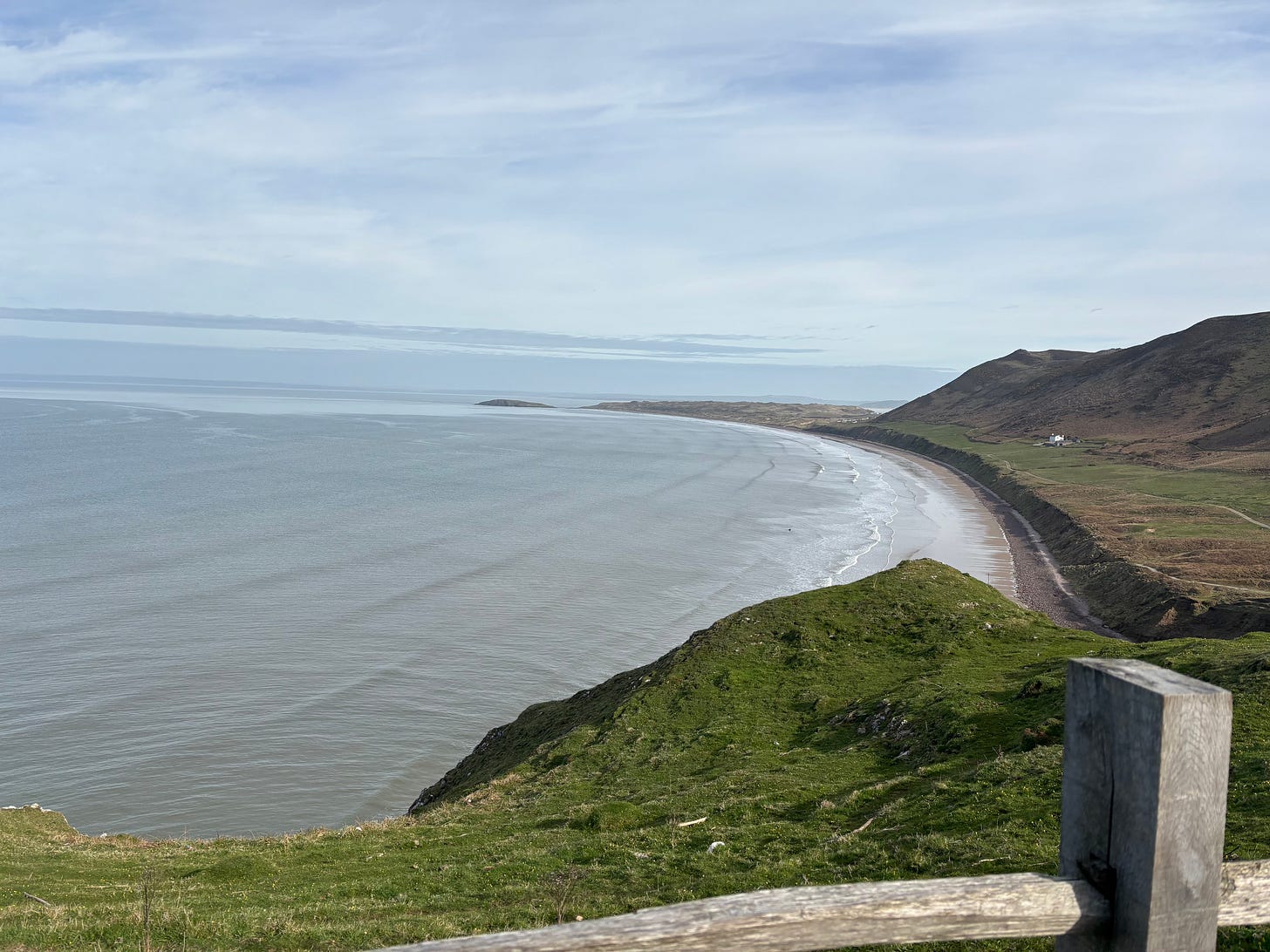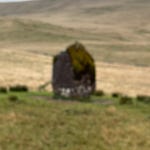Please listen to the audio above first .
Gather close now, friends, and let me take you to a place where the wind sings secrets and the sea holds memories older than time itself. Picture it: Rhossili Bay, that wild, sweeping crescent of sand on the Gower Peninsula, where the cliffs stand like sentinels and the waves crash with a rhythm that feels like the heartbeat of the earth. It’s a place of beauty, aye, but beauty with a shadow, for Rhossili is a land where the veil between worlds is thin, and the ghosts of the past walk bold as you or I. Let me spin you a tale—or rather, a tapestry of tales—woven from the whispers of this haunted bay. Settle in, for the night is long, and the spirits of Rhossili are restless.
The Bay That Remembers
Rhossili Bay stretches out like a canvas painted by a god with a taste for drama. Three miles of golden sand, framed by cliffs that plunge to the sea, and out there, the Worm’s Head—a jagged serpent of rock that slithers into the Atlantic, daring only the brave to cross its causeway. It’s no wonder the poets and painters have flocked here, no wonder it’s called one of the finest beaches in the world. But beauty like this comes with a price, see. The land remembers. Every shipwreck, every soul lost to the tide, every whispered prayer on the wind—it’s all etched into the stones and the salt air.
I first heard the tales of Rhossili’s ghosts from an old man in a pub in Swansea, his eyes bright with the kind of knowing that comes from living close to the edge of things. “Go to Rhossili,” he said, his voice low, “but mind the shadows on the beach at night. They don’t always belong to the living.” And so I went, drawn like a moth to a flame, to walk the sands and listen for the stories the bay might tell.
The Old Rectory and the Thing from the Sea
Let’s start at the Old Rectory, that lonely house perched on the cliffs above the bay. It’s a National Trust property now, all prim and proper for visitors, but don’t let that fool you. There’s a weight to that place, a feeling that clings to your bones. They say it’s haunted, and not by some gentle spirit neither. No, the tales speak of something darker, something that comes from the sea.
The story goes that on moonless nights, when the tide is high and the wind howls like a banshee, a presence creeps up from the waves. Locals call it “the Thing,” though none can quite describe it. “Unpleasant,” they say, their voices dropping to a whisper. “Very unpleasant.” Some reckon it’s the ghost of a sailor lost in one of the wrecks that litter the bay—there’ve been plenty, mind, from the *City of Bristol* in 1840 to the *Samuel* in 1900, their timbers still scattered beneath the surf. Others say it’s older, tied to the smugglers who once worked these shores, their greed binding them to the earth long after their bodies were gone.
I walked to the Rectory one evening, just as the sun bled red into the sea. The air was sharp, the kind that cuts through your coat and makes you feel small. I stood by the gate, looking down at the beach, and I’ll swear to you now, the shadows moved in ways they shouldn’t. Not a soul was there, but I felt eyes on me, cold and heavy. And then—a sound, like a sigh, carried on the wind. I didn’t linger, friends. Some stories you don’t chase too close.
But the Rectory has other ghosts, too. Between the wars, a couple staying there saw something that chilled them to the marrow. A man and a woman, dressed in Edwardian finery, standing at the foot of their bed. Their skin was grey, thick as clay, and their eyes… well, they didn’t have eyes, not proper ones. Just hollows, staring. The room turned cold as a crypt, and a voice—soft, but sharp as a blade—whispered, “Why don’t you turn around and look at me?” The couple fled at dawn, and they weren’t the last to feel that dread. Who were they, these grey-skinned specters? Lovers lost to the sea? Smugglers betrayed by their own? Or something older, wearing human shapes like a mask? Rhossili keeps its secrets close.
The Vicar and His Spectral Steed
Now, let’s walk the beach itself, where the sand stretches wide and the waves whisper tales of their own. Here’s where we meet Reverend John Ponsonby Lucas, a man whose name echoes through Rhossili’s history like a tolling bell. Vicar of Rhossili and Llangennith from 1855 to 1908, he was a figure of fire and faith, riding his horse between parishes to tend his flock. A good man, they say, but the land has a way of claiming even the good.
They say the Reverend never left Rhossili, not really. On stormy nights, when the clouds churn black and the sea roars, folk have seen him—a figure in a dark coat, galloping across the beach on a horse that makes no sound. No hoofprints mark the sand, no breath clouds the air, but there he is, riding as if the devil himself were at his heels. Some say he’s still tending his parishes, bound by duty even in death. Others reckon he’s searching for something—a soul he couldn’t save, perhaps, or a truth he never found.
I spoke to a woman in the village, her hands knotted from years of work, who swore she saw him as a girl. “It was dusk,” she told me, “and the beach was empty. Then I heard it—a rhythm, like hooves, but soft, like they were muffled by time. I looked, and there he was, riding toward Worm’s Head. I blinked, and he was gone.” She didn’t smile as she told it, and neither did I. There’s truth in fear, sometimes.
Squire Mansell’s Phantom Coach
But the Reverend isn’t the only one to haunt these sands. Oh no, Rhossili has room for more restless souls, and none so bold as Squire Mansell. A man of wealth and waste, they say, who lived centuries ago and squandered his fortune on dice and drink. Legend has it he buried a treasure somewhere in the bay—gold, perhaps, or jewels—hoping to reclaim it one day. But the sea took him before he could, and now his ghost rides through Rhossili in a coach drawn by spectral horses, searching for what he lost.
Picture it: the night is still, the stars sharp as pins, and then you hear it—a rumble, like thunder, but closer, coming from the cliffs. A coach bursts into view, black as pitch, with horses that glow like moonlight on water. Inside, the Squire, his face twisted with greed, leans out, shouting into the dark. “Where is it? Where’s my gold?” The coach races across the beach, then vanishes into the waves, leaving nothing but the echo of hooves.
I met a fisherman who claimed he saw it, years back, when he was mending nets by the shore. “It came from nowhere,” he said, his voice rough as the sea. “One minute, quiet. The next, this… thing, tearing past me. I smelled smoke, but there was no fire. Just cold, deep in my chest.” He never fished at night again.
The Moor That Watches
Now, let’s step away from the beach, up to Rhossili Moor, behind the village. If the bay is alive with ghosts, the moor is something else—a place that feels like it’s waiting, watching. It’s a landscape of heather and stone, where the wind carries a weight you can’t explain. They say the spirits here are older than the village, older than the church, tied to the Stone Age folk who left their mark in the caves and barrows of Gower.
I walked the moor one grey afternoon, the kind where the sky presses down like a lid. There’s a silence there, but it’s not peaceful—it’s heavy, like the air before a storm. Some say they’ve felt it: a presence, timeless and vast, that makes your skin prickle and your heart race. One tale speaks of a hiker who strayed too far and felt “eyes on him, not human, not animal, just… wrong.” He ran, he said, and didn’t look back.
The moor’s ghosts don’t show themselves, not like the Reverend or the Squire. They’re shadows in your mind, a whisper you can’t quite hear. Maybe they’re the echoes of those ancient folk, guarding their land. Maybe they’re something else, something the land itself birthed. All I know is, when I stood there, I felt small, like the moor could swallow me whole and never blink.
The Stories That Bind Us
So, what are we to make of these tales, these ghosts of Rhossili Bay? Are they real, you ask? Well, that depends on what you mean by real. The stories are true enough—true in the way they’ve shaped this place, true in the way they linger in the hearts of those who live here. The Old Rectory, the beach, the moor—they’re more than stone and sand. They’re keepers of memory, of loss and longing, of lives that touched this land and left a mark.
I think of that old man in the pub, his words like a key to a door I didn’t know was there. “Mind the shadows,” he said, and I do. Not out of fear, mind, but respect. For Rhossili is a place that asks you to listen, to feel the weight of time in the wind and the waves. The ghosts—whether they’re spirits or stories—remind us we’re part of something bigger, something that stretches back and forward, forever.
So, next time you find yourself at Rhossili, walk the beach at dusk. Stand by the Rectory and look to the sea. Feel the moor’s silence wrap around you. And if you hear a whisper, or see a shadow move where none should be, don’t run. Listen. For the ghosts of Rhossili have stories to tell, and they’ve been waiting, oh so long, for someone to hear them.



















Share this post